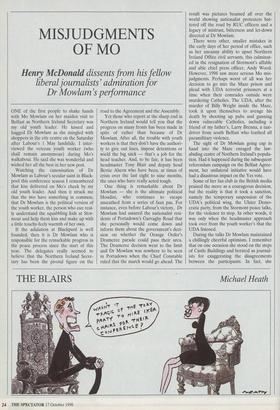MISJUDGMENTS OF MO
Henry McDonald dissents from his fellow liberal journalists' admiration for Dr Mowlam's performance ONE of the first people to shake hands with Mo Mowlam on her maiden visit to Belfast as Northern Ireland Secretary was my old youth leader. He kissed and hugged Dr Mowlam as she mingled with shoppers in the city centre on the Saturday after Labour's 1 May landslide. I inter- viewed the veteran youth worker (who shall remain anonymous) during Mo's walkabout. He said she was wonderful and wished her all the best in her new post.
Watching the canonisation of Dr Mowlam as Labour's secular saint in Black- pool this conference season I remembered that kiss delivered on Mo's cheek by my old youth leader. And then it struck me that the two have something in common, that Dr Mowlam is the political version of the youth worker, the person who can real- ly understand the squabbling kids at Stor- mont and help them kiss and make up with a little touchy-feely warmth of her own.
If the adulation at Blackpool is well founded, then it is Dr Mowlam who is responsible for the remarkable progress in the peace process since the start of this year. The delegates really seemed to believe that the Northern Ireland Secre- tary has been the pivotal figure on the road to the Agreement and the Assembly.
Yet those who report at the sharp end in Northern Ireland would tell you that the progress on many fronts has been made in spite of rather than because of Dr Mowlam. After all, the trouble with youth workers is that they don't have the authori- ty to give out lines, impose detentions or wield the big stick — that's a job for the head teacher. And, to be fair, it has been headmaster Tony Blair and deputy head Bertie Ahern who have been, at times of crisis over the last eight to nine months, the ones who have really acted tough.
One thing is remarkable about Dr Mowlam — she is the ultimate political Houdini, who continues to escape unscathed from a series of faux pas. For instance, even before Labour's victory, Dr Mowlam had assured the nationalist resi- dents of Portadown's Garvaghy Road that she personally would come down and inform them about the government's deci- sion on whether the Orange Order's Drumcree parade could pass their area. The Drumcree decision went to the limit and Dr Mowlam was nowhere to be seen in Portadown when the Chief Constable ruled that the march would go ahead. The result was pictures beamed all over the world showing nationalist protesters bat- tered off the road by RUC officers and a legacy of mistrust, bitterness and let-down directed at Dr Mowlam.
There were other, smaller mistakes in the early days of her period of office, such as her uncanny ability to upset Northern Ireland Office civil servants, this culminat- ed in the resignation of Stormont's affable and able chief press officer, Andy Wood. However, 1998 saw more serious Mo mis- judgments. Perhaps worst of all was her decision to go into the Maze prison and plead with UDA terrorist prisoners at a time when their comrades outside were murdering Catholics. The UDA, after the murder of Billy Wright inside the Maze, took it upon themselves to avenge his death by shooting up pubs and gunning down vulnerable Catholics, including a friend of my father's, Larry Brenna, a taxi- driver from south Belfast who loathed all paramilitary violence.
The sight of Dr Mowlam going cap in hand into the Maze enraged the law- abiding centre of Northern Ireland's popula- tion. Had it happened during the subsequent referendum campaign on the Belfast Agree- ment, her unilateral initiative would have had a disastrous impact on the Yes vote.
Some of her fan club in the British media praised the move as a courageous decision, but the reality is that it took a sanction, namely the temporary suspension of the UDA's political wing, the Ulster Demo- cratic party, from the Stormont peace talks, for the violence to stop. In other words, it was only when the headmaster approach took over from the youth worker's that the UDA listened.
During the talks Dr Mowlam maintained a chillingly cheerful optimism. I remember that on one occasion she stood on the steps of Castle Buildings and berated us journal- ists for exaggerating the disagreements between the participants. In fact, she informed us that they were getting on bet- ter than we could imagine.
The talks almost ended in no agreement. It took Mr Blair's powers of persuasion and Mr Ahern's assurances to David Trim- ble to convince the Ulster Unionists to sign the Good Friday deal. As the deputy UUP leader John Taylor has recently reminded us, it was only Mr Blair's letter to Mr Trimble on Good Friday which per- suaded sceptics like him to back the deal.
Mo was also more or less absent during the month-long referendum campaign. Again it was Mr Blair who employed heli- copter-driven shuttle diplomacy to per- suade the Northern Ireland electorate, and in particular that critical band of undecid- ed unionist voters, to support the Agree- ment. His handwritten pledges on decommissioning were one of the key fac- tors in bolstering the Yes campaign.
Throughout the process, whenever the UUP leadership had a problem they went straight to Downing Street (and still do), bypassing the Secretary of State.
In recent months Northern Ireland has sailed through a series of storms without Mo at the helm. Following a divisive refer- endum campaign and subsequent Assembly elections, the hurricane of Drumcree IV came blowing across the political landscape. In the end the British government's defi- ance of the Orange threat and the deaths of the Quinn children effectively ended mass loyalist opposition and protest. Negotia- tions behind the scenes before and after Drumcree IV were chaired by Jonathan Powell, Mr Blair's able chief of staff. The Secretary of State took a back seat.
On a par with Dr Mowlam's trips to the Maze prison is her refusal (up to now) to put the Loyalist Volunteer Force ceasefire on full parity with the other terrorist cessa- tions. By doing so she risks missing a golden opportunity to see paramilitary decommis- sioning begin. The LW has offered to hand in weapons 'within hours rather than days' if the government allows its prisoners to join the early release scheme.
Of course the LVF's motivation is entirely cynical. It is an organisation in dis- array, with no more cards left to play to get its prisoners out except the offer of dis- armament. Dr Mowlam, though, has been coming under pressure from other paramilitary representatives not to recog- nise in full the LW cessation. The upshot of this is that the British government has quietly maintained an unofficial policy of `good terrorist/bad terrorist'.
Now this is a morally absurd position. Among those to be released from the 'good terrorist' wings of the Maze are men who have placed bombs which have blown young children to pieces, sectarian thugs who 'slit the throat of a young Catholic woman, maniacs who machine-gunned pubs, caus- ing mass slaughter. Are these people really any different from the 'bad terrorists' who occupy block H6 of the Maze prison?
One cannot but admire the way Mo has continued to work despite her illness. Her courage and fortitude (I know from person- al experience, having come through a seri- ous cancer scare) has inspired others in the same situation. She has also been a wel- come change from cold, patrician Tories like Sir Patrick Mayhew and his slightly more jolly predecessor, Peter Brooke.
But it is vital to remember that Northern Ireland politics is not a youth club but rather a bear-pit containing some of the most spoilt and disturbed political delin- quents in the democratic world. Under- standing the kids is not enough; sometimes the headmaster has to take charge and wield the cane. The touchy-feely, huggy- wuggy stuff doesn't work when you're deal- ing with Ulster's politicians, particularly those with private armies at their disposal.
As a cautious optimist about the peace process, I find it odd that while a potential Northern Ireland settlement will probably be Tony Blair's lasting historic achieve- ment, the Prime Minister passes on the laurels to his Northern Ireland Secretary. But then we only ever have fond memories of our youth workers; it's the head teach- ers we always want to forget.
The author is Northern Ireland correspon- dent and columnist of the Observer.











































































 Previous page
Previous page